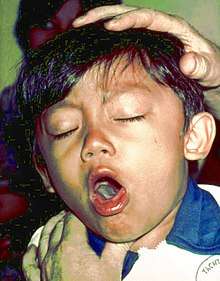pertussis
See also: pertússis
English

A young boy coughing due to pertussis
Pronunciation
- IPA(key): /pəˈtʌsɪs/
Noun
pertussis (countable and uncountable, plural pertusses)
- (pathology) Whooping cough.
- 1976, Charles R. Manclark, The Current Status of Pertussis Vaccine: An Overview, D. Perlman (editor), Advances in Applied Microbiology, Volume 20, page 1,
- With the introduction of an improved and standardized pertussis vaccine in the 1940s, there followed a remarkable decline in pertussis in the United States, most of the Western world, and Australia, New Zealand, and Japan.
- 2009, Zoë E. V. Worthington, Nicholas H. Carbonetti, 18: Bordetella pertussis, Karl Wooldridge (editor), Bacterial Secreted Proteins: Secretory Mechanisms and Role in Pathogenesis, page 413,
- Bordetella pertussis is a Gram-negative bacterial pathogen that infects the human respiratory tract, causing the disease pertussis or whooping cough.
- 2015, Dr. Stephen Berger, Pertussis: Global Status, GIDEON Informatics, Inc., E-book, page 343,
- During 1993 to 2004, the hospitalization rate [in the US] for pertussis among infants ages <= 2 months was 239 per 100,000 live births.
- 1976, Charles R. Manclark, The Current Status of Pertussis Vaccine: An Overview, D. Perlman (editor), Advances in Applied Microbiology, Volume 20, page 1,
Related terms
Spanish
This article is issued from
Wiktionary.
The text is licensed under Creative
Commons - Attribution - Sharealike.
Additional terms may apply for the media files.